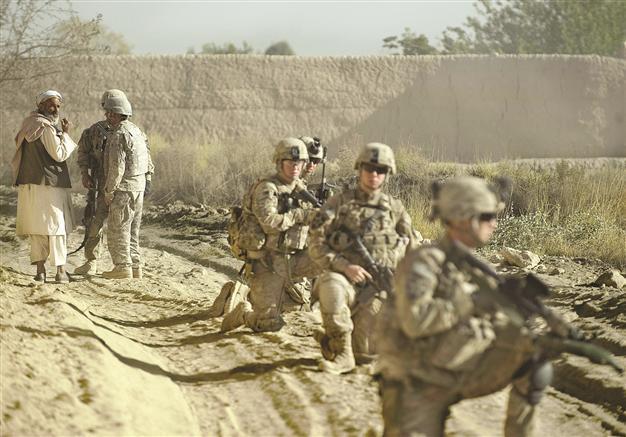Early Afghan pullout signalled
BRUSSELS

An Afghani man is questioned by US soldiers through an interpreter in Panjwai. “From now until the end of 2014 we will see
announcements of redeployments, withdrawals or a drawdown” says Rasmussen about NATO withdrawal from Afghanistan. AFP photo
NATO could withdraw its troops from Afghanistan even earlier than 2014, NATO Secretary-General Anders Fogh Rasmussen has said, while admitting that the recent insider attacks had been successful in sapping morale.
“From now until the end of 2014 you may see an adaptation of our presence. Our troops can redeploy, take on other tasks, or even withdraw, or we can reduce the number of foreign troops,” Rasmussen said in an interview with British daily The Guardian. “From now until the end of 2014 we will see announcements of redeployments, withdrawals or a drawdown … If the security situation allows, I would not exclude the possibility that in certain areas you could accelerate the process.”
NATO has more than 100,000 troops fighting a Taliban insurgency in Afghanistan, but they are due to pull out by the end of 2014.
Rasmussen said the pace of the withdrawal will be established later this year when Gen. John Allen, the U.S. overall commander of the operations, delivers a report with his military recommendations.
“Political decisions will be taken based on his recommendations as to how we will adapt to the transfer of lead responsibility to the Afghans,” he said. “The pace will very much depend on the security situation on the ground.” The NATO chief said any accelerate in the rate of withdrawal should not be seen as “a race for the exit.”
Touching on the recent rise in the number of “insider attacks” in which Afghan security forces turned their weapons against their coalition allies, Rasmussen admitted that the killings of almost 50 allied troops this year had damaged the relationship between the international forces and the Afghan police and military. “There’s no doubt that insider attacks have undermined trust and confidence, absolutely,” he said.
“It’s safe to say that a significant part of the insider attacks are due to Taliban tactics … Probably it is part of a Taliban strategy,” he added.
At least 51 coalition troops have been killed in insider assaults this year, about 15 percent of all NATO deaths. Gen. Allen has described them as “the signature attack” of the Afghan war.
